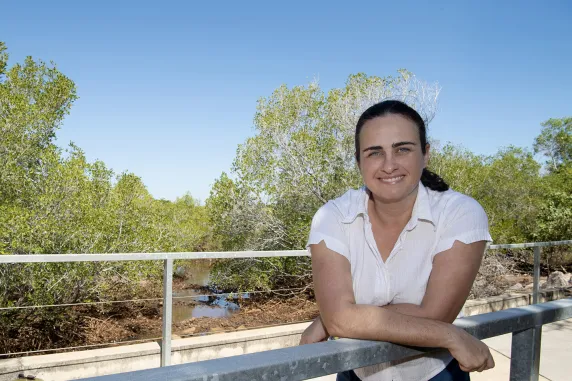News article
Science judges place CDU ecologist in top tier
Charles Darwin University ecologist Dr Carla Eisemberg has been recognised for research excellence by judges searching for Australia’s nominee for the internationally prestigious APEC ASPIRE Prize.
Dr Eisemberg was shortlisted among three top-ranked Australians in a competition run by the Australian Government and the Australian Academy of Science, an honour that carries a $2000 prize.
It is understood that Dr Eisemberg is the first Territorian finalist in the six years that the Australian Academy of Science has overseen the ASPIRE Prize (APEC Science Prize for Innovation, Research and Education).
The winner was marine conservationist Dr Amelia Wenger and the other finalist Dr Jeremy Simmonds, both of Queensland.
Dr Eisemberg, who is regarded as a “tropical waters turtle expert”, said it was an honour to have been selected as a finalist and have her research acknowledged.
“I’d like to congratulate my fellow finalists and especially Dr Wenger, the Australian nominee for the APEC Prize,” Dr Eisemberg said.
The CDU Science Outreach Manager’s research has shown the importance of wild meat as a source of micronutrients to remote communities.
A major discovery during this project was the finding that turtle meat has a high concentration of iron.
“These results may be used in future health programs addressing anaemia or may serve as an inspiration for Indigenous enterprises, such as turtle farming,” Dr Eisemberg said.
The Darwin-based researcher is also the International Union for Conservation of Nature red list (threatened species) coordinator for the Tortoise and Freshwater Turtle Specialist Group.
In 2018 she coordinated a red listing workshop in Singapore where specialists assessed the status of 90 species of tortoises and freshwater turtles.
Related Articles

First “hype cycle” of AI development put tech above humans
Users around the world have rushed to adopt artificial intelligence - especially in safety-critical fields - but a new study has revealed the hype has prioritised technology for technology’s sake instead of human-centred development.
Read more about First “hype cycle” of AI development put tech above humans
Nanoplastics hindering cognitive abilities of fish, international research shows
Nanoplastic exposure can impair the cognitive abilities of fish and could lead to significant impacts on marine species’ ability to survive, according to a new international study.
Read more about Nanoplastics hindering cognitive abilities of fish, international research shows
New project to grow Indigenous aquaculture on one of Australia’s largest islands
An Australian island’s efforts to improve food security and transition into a blue economy will be bolstered by a new project to propagate a nutritious and increasingly popular fish.
Read more about New project to grow Indigenous aquaculture on one of Australia’s largest islands
